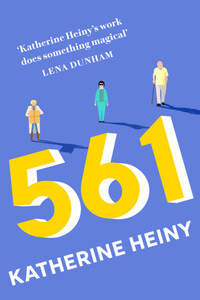4th Estate
An imprint of HarperCollinsPublishers
1 London Bridge Street
London SE1 9GF
www.4thEstate.co.uk
This eBook first published in Great Britain by 4th Estate in 2018
Copyright © Katherine Heiny 2018
Cover design by Heike Schüssler
Katherine Heiny asserts the moral right to
be identified as the author of this work
A catalogue record for this book is
available from the British Library
All rights reserved under International and Pan-American Copyright Conventions. By payment of the required fees, you have been granted the non-exclusive, non-transferable right to access and read the text of this e-book on-screen. No part of this text may be reproduced, transmitted, downloaded, decompiled, reverse engineered, or stored in or introduced into any information storage and retrieval system, in any form or by any means, whether electronic or mechanical, now known or hereinafter invented, without the express written permission of HarperCollins
Ebook Edition © July 2018 ISBN: 9780008319540
Version: 2018-06-25
Just as Jane Austen believed that four people cannot comfortably walk abreast, Charlene believes that three people cannot amicably move one person’s belongings. At least, not when two of the people used to be married to each other, and the marriage resulted in a bitter divorce in order for one of them to marry the third person.
What’s more, Charlie’s husband, Forrest, had knee-replacement surgery six weeks ago and is still using a cane, and Forrest’s ex-wife, Barbara, has some mysterious but convenient ailment—sciatica? nerve damage?—that prevents her from lifting things so Charlie will be the only able-bodied one today. This is the true price of infidelity, she thinks: twenty years later you and your husband have to help his ex-wife move out of the former family home. On a Saturday. In January. In DC. It is fifteen degrees below freezing with a brisk wind slicing through the air.
The wind hits Charlie as soon as she steps out of her front door, chilling her all the way through. She waits for Forrest to make his way past her, then locks the door and helps him down the driveway to their car. She leaves him by the passenger door and hurries around to the driver’s side, her breath pluming out in front of her, like white feathers. Snow is piled high on either side of the damp asphalt driveway. The air is cold and flat and smells of nothing.
Charlie gets into the car and starts the engine. “Tell me why we’re doing this again,” she says to Forrest.
He buckles his seatbelt, not looking at her. “Because we’re friends.”
“Barbara and I are not friends,” Charlie says emphatically.
“Well, sort of friends,” he says. “Friendly.”
Charlie gives him a look as she backs the car out of the driveway. “She called me a whore once.”
“But that was a long time ago,” Forrest says. “Now you’ve reached a détente. You’re more like North and South Korea.”
Charlie frowns thoughtfully. “Would South Korea help North Korea move, though?”
“Well, it’s more like pre-moving,” Forrest says. “Barbara just needs someone to help her pack up the more fragile stuff before the real movers come tomorrow.”
“But why us?” Charlie asks.
“I know it means a great deal to Stephen and Ross,” Forrest answers, and a little silence falls between them because, really, that says everything there is to say. Stephen and Ross are Forrest and Barbara’s twin sons, now all grown-up and living in California. Forrest will do anything to stay in their good graces, and so will Charlie, actually, though she can’t help thinking that if it means so much to them, maybe they should come do it themselves.
Why can’t Barbara and Forrest be one of those acrimonious divorced couples who spit when they say each other’s names? They had done that for a while, in the beginning, with threats and insults and stormy phone calls. It had not been without its satisfactions.
Charlie had met Barbara before she met Forrest, when she and Barbara had volunteered at a suicide prevention hotline. Charlie had been a psych major at American University then, fulfilling her community-service requirements, and Barbara had been doing something she referred to vaguely as “good works”. As far as Charlie could tell, good works meant that Barbara did a lot of volunteer work—at the hotline, at the hospital gift shop, at the humane society—but no place where she might actually come into physical contact with a real live homeless or mentally ill person. Charlie had always had the impression that Barbara liked her good works to be once-removed.
Charlie had met Forrest at a fundraising concert Barbara had arranged for the hotline. It was held in the back room of a Mount Pleasant music center, and folding chairs had been provided but not set up—Charlie and Forrest had done that while Barbara supervised the ticket table in the hall. (This is how Charlie knows about Barbara’s nerve damage or whatever the hell it is that prevents her from lifting anything.) During the concert, Charlie and Forrest had sat in the back row and whispered to each other, wondering whether the string quartet was playing so solemnly because that was their style or because they were afraid of their chairs toppling off the stage, which was on the small side. Afterward, Charlie and Forrest took much longer than necessary taking down the chairs—Charlie’s love for Forrest would always be inextricably linked with pain in her lower back—and she could remember standing next to him as they stacked the last chairs on the metal racks. Not even their shoulders were touching but she had felt as though their bodies were pressed together. Then she had glanced toward the hallway and realized that Barbara was watching them from behind the door, one eye visible, like a disapproving cyclops.










